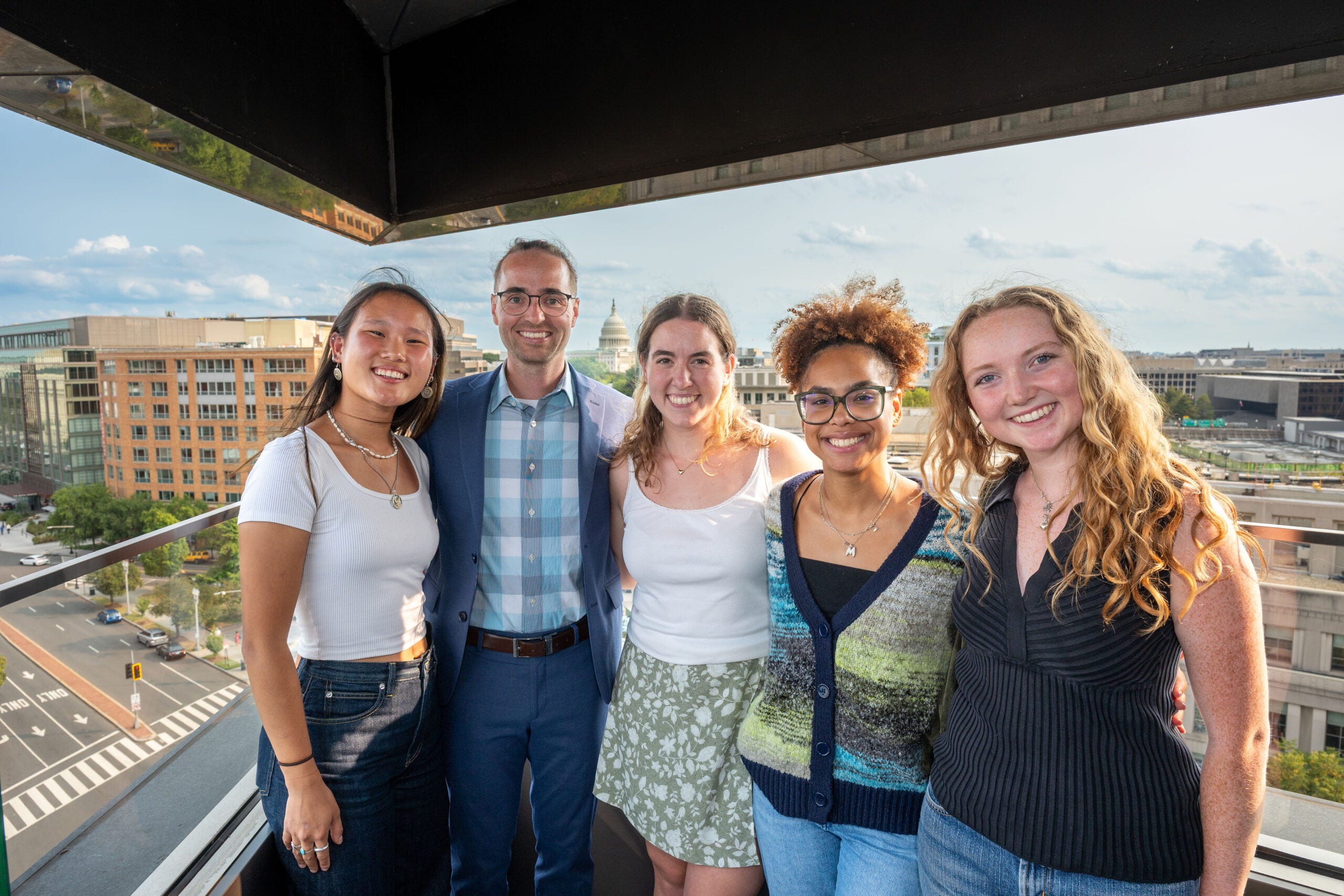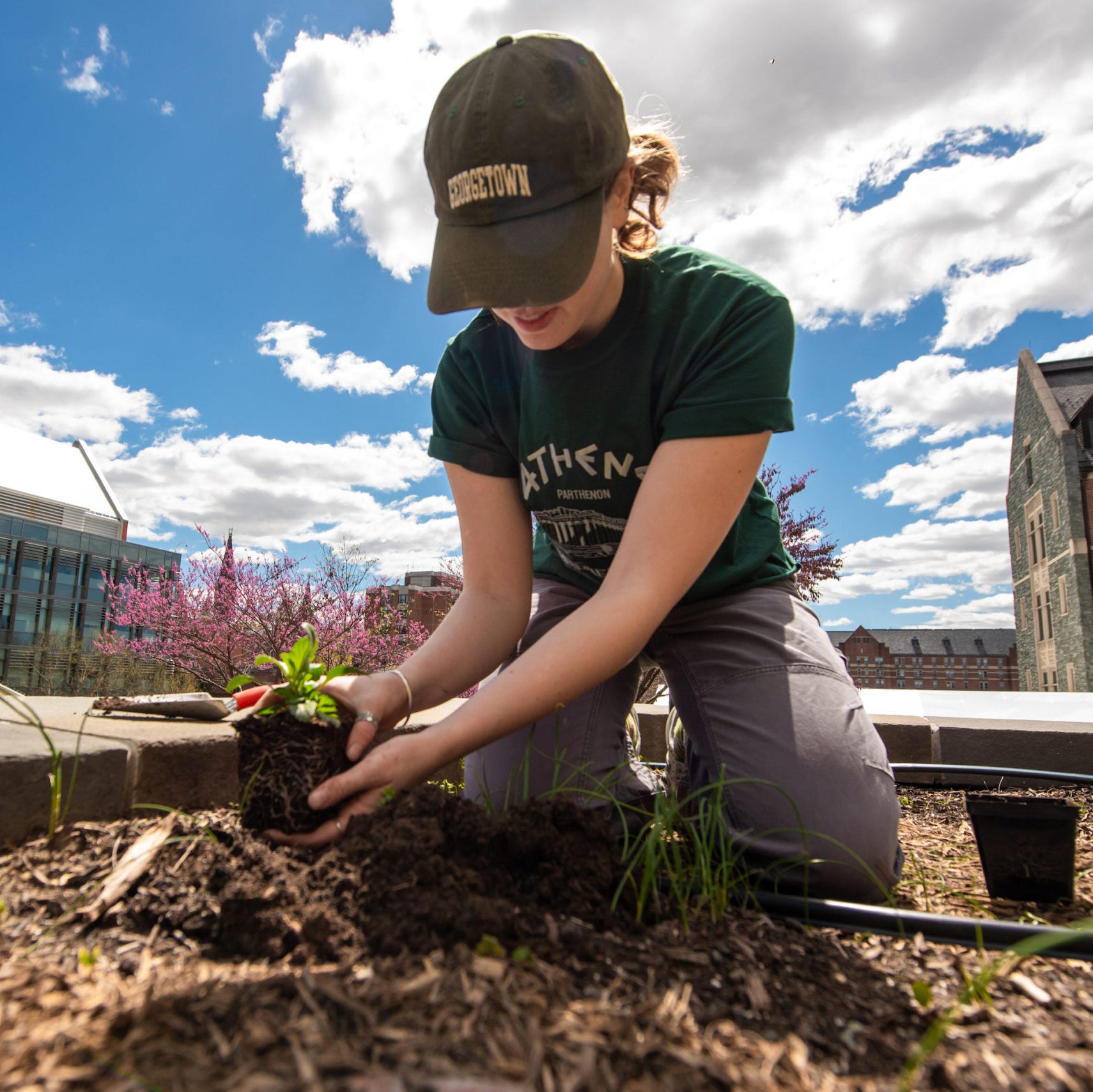The E&S minor encapsulates the learning goals built into the BS-ES degree, including an inherent interdisciplinarity that encompasses science, policy, and humanities perspectives.
Requirements
The E&S minor requires completing 18 credits:
- ERTH 1050/51 (Environmental & Sustainability Science I + Lab) (4 credits)
- ERTH 2240 Environmental Justice (3 credits)
- Either ERTH-1008 + 1009 (Ecological Belonging + Wellbeing); OR ERTH-1018 + 1019 (Environment & Power + Embodied Transformation) (2 credits total)
- Approved second environmental science class, such as ERTH-3750 or 3575 (3 credits)
- Electives (tagged/approved) (6 credits)
2 Ways to Complete the Minor
Accelerated Minor
Complete most requirements in one semester living and learning at the Capitol Campus
Traditional Minor
Take courses across the Hilltop and Capitol Campuses throughout your four years of study
Accelerated Minor
Spend Spring 2026 living and learning at Georgetown’s Capitol Campus and complete the majority of the E&S Minor in one accelerated semester. Here’s why you should choose the Accelerated E&S Minor:
- Finish the bulk of the minor in one semester: Earn 12 credits in Spring 2026
- Live and learn in the heart of DC: Spring 2026 E&S Accelerated Minor students will join Georgetown’s Capitol Campus community, be housed at 55 H Street NW, and take most coursework at 111 Massachusetts Ave NW on the Capitol Campus
- Internship + coursework: Pair a credit-bearing DC internship with integrative classes and professional development
- Optional study-abroad component: ERTH 3575 Yucatán includes an optional spring-break research trip to Mexico
Accelerated Minor Requirements
Complete these on the Hilltop before or after your Capitol Campus semester:
Mandatory Foundation Science (4 cr) — Hilltop only
ERTH-1050: Environmental & Sustainability Science I (3 cr)
ERTH-1051: Environmental & Sustainability Science I Lab (1 cr)
Mandatory Interruption/Integration Series (2 cr) — Hilltop only; choose one set
ERTH-1008 / ERTH-1009: Ecological Belonging & Wellbeing (1 cr each); or
ERTH-1018 / ERTH-1019: Environment & Power & Embodied Transformation (1 cr each)
Complete these on the Capitol Campus in Spring 2026:
Second Science Course* (3 cr) — Capitol Campus; choose one
ERTH 3575: Yucatán: Conservation, Culture & Environmental Sustainability (includes spring-break trip) (3 cr)
ERTH 3750: Global Health & Climate Change (3 cr)
*Note: If you have already taken ERTH-1060 and ERTH-1061, you do not need to take a second science course. However, you can take either or both of these courses as electives if you would like.
Electives (6 cr) — Capitol Campus; choose two
ERTH 3550: Culture & Advocacy for Climate Resilience in DC (3 cr)
ERTH 4040: International Community-Based Conservation (3 cr)
ERTH 4156: Life on High Seas: Ecology & Policy (3 cr)
CALL XXXX: Environmental Law (3 cr)
Environmental Justice (3 cr)** — Capitol Campus Spring 2026
ERTH 2662: Eco-Spirituality, Ecofeminism, and Environmental Justice (3 cr)
****Note: If you have already taken ERTH 2240, you do not need to take this environmental justice course. But, instead you can take this class as an elective if you would like.
How to Join & Key Dates
- Capitol Campus intent (housing guarantee*): October 20, 2025. Complete this form to guarantee your housing on the Capitol Campus for Spring 2026
Intent to Participate & Housing Form › - Yucatán course* (optional): October 10, 2025 — space is limited!
Yucatán Sign-Up Form ›
*The Yucatán course is not required to complete the accelerated minor.
What happens next
Once you submit the intent to participate & housing form, we’ll keep in regular contact about your status in the program, course enrollment, internship opportunities, and begin connecting you with your future cohort and alumni network.
If accepted:
- We will notify your academic advising dean about your participation.
- We will alert Housing regarding your Fall semester plans.
- If you require housing or ADA accommodations, please register with ARC for Spring 2026.
- For questions, reach out to Vice-Dean Anne Rosenwald at anne.rosenwald@georgetown.edu
- We are excited to welcome you to the Capitol Campus cohort!
Contact
Email anne.rosenwald@georgetown.edu
E&S Minor and College Core
| Required Foundational Courses | Credits | Core Requirement Fulfillment |
|---|---|---|
| ERTH-1050: Environmental & Sustainability Science I | 3 cr | Science for All (when taken with ERTH-1051) |
| ERTH-1051: Environmental & Sustainability Science I Lab | 1 cr | Science for All (when taken with ERTH-1050) |
| ERTH-1060: Environmental & Sustainability Science II | 3 cr | – |
| ERTH-1061: Environmental & Sustainability Science II Lab | 1 cr | – |
| ERTH 2240: Environmental Justice | 3 cr | Pathways to Social Justice |
Interruption/integration courses (must take all to fulfill HALC)
| Interruption/Integration Courses | Credits | Core Requirement Fulfillment |
|---|---|---|
| ERTH-1008: Opening Interruption: Ecological Belonging | 1 cr | HALC if taken with ERTH-1009,-1018,-1019 |
| ERTH-1009: Closing Integration: Wellbeing | 1 cr | HALC if taken with ERTH-1008,-1018,-1019 |
| ERTH-1018: Opening Interruption: Environment & Power | 1 cr | HALC if taken with ERTH-1008,-1009,-1019 |
| ERTH-1019: Closing Integration: Embodied Transformation | 1 cr | HALC if taken with ERTH-1008,-1009,-1018 |
How to Declare
The minor can be declared by filling out a change of program form in the College or emailing your Dean in any other schools.
Pursuing the accelerated minor? Complete the Intent & Housing Form


